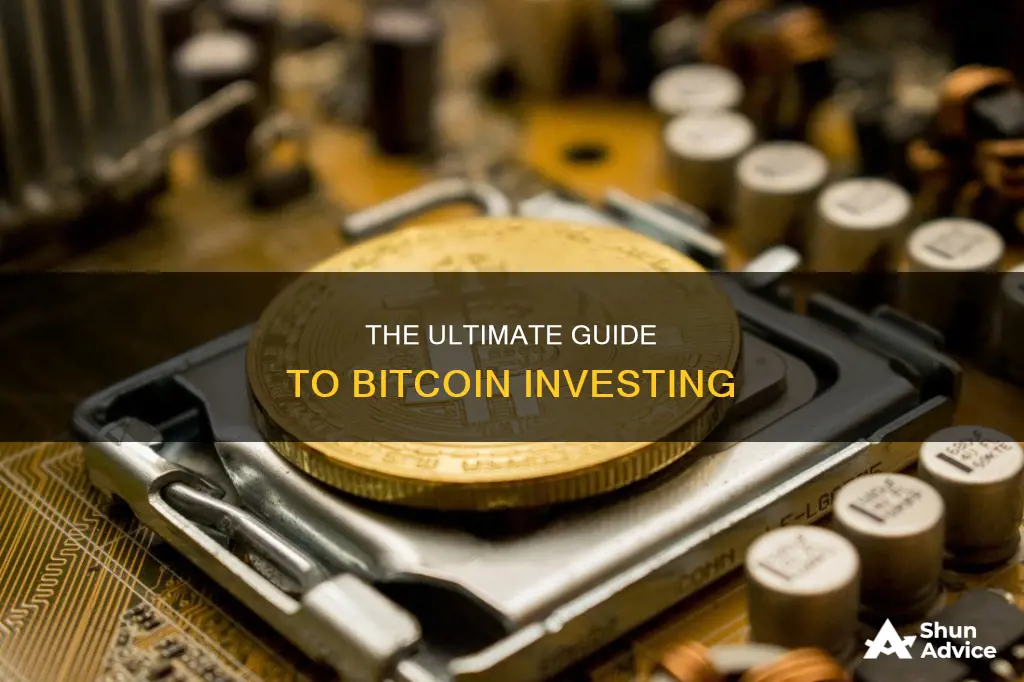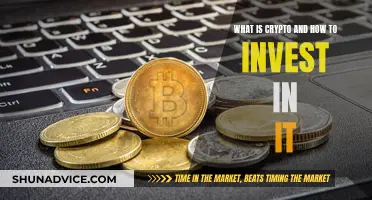
Bitcoin is a type of cryptocurrency, a virtual currency that acts as a source of purchasing power. It is one of the most widely used types of cryptocurrency and has seen a meteoric rise in recent years.
There are several ways to invest in Bitcoin, including:
- Using a cryptocurrency exchange
- Using a traditional stockbroker
- Using a money transfer app
- Using a Bitcoin ATM
- Using a Bitcoin ETF
Before investing in Bitcoin, it is important to understand the risks involved. Bitcoin is a very high-risk and volatile asset, and its value may rise or fall dramatically in a very short period. It is not backed by any physical asset or central regulator, and there is no guarantee that its value will remain stable.
It is also important to have all your finances in order before investing in Bitcoin, including having an emergency fund in place and a manageable level of debt. Only invest an amount that you can afford to lose, and consider starting small to get a grasp of how the process works.
| Characteristics | Values |
|---|---|
| How to buy Bitcoin | Via a cryptocurrency exchange, traditional stockbroker, money transfer app, Bitcoin ATM, or Bitcoin ETF |
| Bitcoin wallets | Hot wallets (online wallets) or cold wallets (offline hardware wallets) |
| Risks | Volatile asset prone to large and fast swings in value |
| Investment advice | Only invest what you can afford to lose; don't invest more than 5% or 10% of your portfolio in Bitcoin |
| Other ways to invest in cryptocurrency | Crypto futures, Bitcoin ETFs, crypto exchange or broker stocks, blockchain ETFs |
What You'll Learn

Choosing a crypto-trading service or venue
Exchanges
Exchanges are a convenient option because they offer a breadth of features and more cryptocurrencies for trading. Exchanges also enable investors to buy, sell, and hold cryptocurrency and allow users to transfer crypto to their online wallet for safekeeping.
There are many types of cryptocurrency exchanges. Some allow users to remain anonymous and are decentralized and don't require users to enter personal information. On the other hand, popular exchanges in the U.S. aren't decentralized and follow laws that require users to submit identifying documentation. These include Coinbase, Kraken, Gemini, and Binance, which offer bitcoin and a growing number of altcoins.
When creating an account with an exchange, it is important to use two-factor authentication and a long, unique password that includes a variety of letters, special characters, and numbers.
Payment processors
Cash transfer services like PayPal, Venmo, or Cash App allow their users to purchase Bitcoin using the apps. You can purchase, store, send and sell Bitcoin directly through the apps, which is convenient if you're used to those interfaces.
Crypto apps
Some crypto apps, such as games, crypto wallets, or other online services that use blockchain technology, allow users to buy and sell digital assets directly within their app.
Crypto ATMs
Bitcoin ATMs act like in-person bitcoin exchanges. Individuals can insert cash into a machine and use it to purchase bitcoin, which gets transferred to online wallets for users. Bitcoin ATMs have become increasingly popular in recent years and are available at retail giant Walmart.
Two charges are associated with ATM bitcoin purchases: a purchase fee and a conversion fee for converting a fiat currency to bitcoin. Both fees are fairly steep compared with those of other options. The worldwide average purchase fee at bitcoin ATMs is 8.4% of the purchase amount and 5.4% for sales.
P2P exchange services
Some peer-to-peer exchange services provide a more direct connection between users. After creating an account, users can post requests to buy or sell bitcoin, including information about payment methods and prices.
Although P2P exchanges don't offer the same anonymity as decentralized exchanges, they allow users the chance to shop around for the best deal. Many of these exchanges also provide rating systems, so that users have a way to evaluate potential trade partners before transacting.
Gold Coin Investment: Which is the Best Buy?
You may want to see also

Connecting your exchange to a payment option
Depending on the exchange, personal identification may be required. This may include a picture of a driver's license or Social Security card, as well as information about your employer and source of funds. The process is similar to setting up a typical brokerage account.
It is important to note that while you can use a credit card to purchase cryptocurrency, the volatility of cryptocurrency prices combined with a credit card's interest charges could inflate the overall cost of purchasing a token. Additionally, some banks may question or even stop deposits to crypto-related sites or exchanges.
Fees vary for deposits via a bank account, debit, or credit card, and exchanges also charge fees per transaction.
A Beginner's Guide to Investing via Coinbase
You may want to see also

Placing an order
Once you have chosen a crypto-trading service or venue, you can place your Bitcoin order.
Step 1: Choose a Crypto-Trading Service or Venue
First, decide where you want to make a Bitcoin purchase. Most Bitcoin investors use cryptocurrency exchanges, which are the middlemen of cryptocurrency investing, like a stock brokerage. There are several different exchanges that facilitate Bitcoin transactions, including:
- Coinbase
- Binance
- Kraken
- Gemini
- Bitfinex
Step 2: Connect Your Exchange to a Payment Option
You can connect your bank account directly to most exchanges, or you can link it to a debit or credit card. Although you can use a credit card to purchase cryptocurrency, it is not advisable as cryptocurrency price volatility could inflate the overall cost of purchasing a token when combined with a credit card's interest charges.
Step 3: Place Your Order
The big question is, how much Bitcoin should you purchase? Some coins cost thousands of dollars, but exchanges often allow you to buy fractions of a single coin—your initial investment could be as low as $25.
Investing in Bitcoin is very risky, and it’s important that you carefully determine your risk tolerance and review your investment strategy before you purchase any Bitcoin.
Step 4: Safe Storage
Bitcoin and cryptocurrency wallets are a place to store digital assets more securely. Keeping crypto outside the exchange and in a personal wallet ensures that investors have control over the private key to the funds.
There are two types of wallets you can get: a "hot wallet" or a "cold wallet". A hot wallet is a wallet that’s operated by either your cryptocurrency exchange or by a provider. Some exchanges will automatically provide you with a hot wallet when you open your account. In any case, hot wallets are convenient because you’ll be able to access your coins through the internet or a software program.
A cold wallet is the safest storage method for your coins. A cold wallet is an actual piece of hardware that stores your coins, usually a portable device that’s similar to a flash drive.
Finding a Bitcoin Miner: Where to Invest?
You may want to see also

Safe storage
Once you've decided to invest in Bitcoin, you'll need to find a secure place to store it. Bitcoin can be stored in two types of digital wallets: a hot wallet or a cold wallet.
Hot wallets are connected to the internet and are often provided by your chosen cryptocurrency exchange. They are convenient because you can access your coins through the internet or a software program. However, they are not the most secure form of coin storage. If the hot wallet provider is hacked, your coin information may be at risk.
Cold wallets, on the other hand, are small, encrypted portable devices that allow you to download and carry your Bitcoin. They are considered much more secure than hot wallets as they are not connected to the internet and are therefore less likely to be compromised. Cold wallets can cost less than $100 and are a good option if you're trading large amounts of coin.
- Use two-factor authentication and a long, unique password that includes a mix of letters, special characters, and numbers.
- Be cautious of "pump-and-dump" schemes, where predatory investors convince amateur investors to pour money into Bitcoin, causing a surge in prices. The predatory investors then sell all their holdings before the buying surge ends, making a huge profit. When investors stop buying, the value of the coins falls, and unknowing investors lose their money.
- Do not give anyone your private key.
- Consider using a hardware wallet such as TREZOR or a cold storage wallet using BitKey.
- Diversify your investment portfolio. Your primary investments should be low-risk, like government bonds or index funds. Next, opt for medium-risk investments, like real estate or corporate stocks, and make high-risk investments, like Bitcoin, your smallest and least-prioritized investments.
- If you're new to Bitcoin investing, start small. Consider investing a small amount each week to see how it goes.
- Be aware of the risks of storing your Bitcoin on different types of media. For example, computers can crash, data on CDs and floppy disks can become corrupted, and flash drives can break and be damaged by magnetic fields.
Remember, investing in Bitcoin is very risky, and it's important to carefully determine your risk tolerance and review your investment strategy before purchasing any Bitcoin.
Shiba Inu Coin: A Guide to Investing in India
You may want to see also

Understanding the risks
Bitcoin is a very high-risk investment. It is a volatile asset, meaning its value can rise or fall dramatically in a very short space of time. As there is no central regulator, its value is entirely dependent on market demand. If there are more buyers, the value will increase, and if there are fewer, the value will decrease.
There is also no intrinsic value to Bitcoin. It is not backed by any physical asset, like gold or silver, and its value is not linked to the profits of any one corporation.
Volatile Market
The Bitcoin market is unpredictable, and there is no guarantee of a return on your investment. It is recommended to make small investments and to keep a vigilant eye on the market to avoid a massive loss.
Cyberattacks and Fraud
As Bitcoin is technology-based, it is open to cyberattacks and hacking. There is also no way to retrieve lost or stolen Bitcoins. Many reports suggest that buyers lose their investments on exchanges and mining losses. Additionally, there is a fair amount of fraud in the Bitcoin market, with fake exchanges duping investors out of their Bitcoins.
Little or No Regulation
The Bitcoin market currently operates with no major regulations. The government doesn't have a clear stance on cryptocurrency, and it is not taxed. This lack of taxation could lead to problems if Bitcoin were to become competition for government currency.
Technology Reliance
Bitcoin is 100% technology-based, so owners are more vulnerable to cyber threats and online fraud. Without the technology, Bitcoin would be worthless.
Block Withholding
New Bitcoins are created by solving mathematical equations called "blocks". However, a mining pool can use computational power to mine a block and hide it from honest miners, allowing a select few to reap the benefits while others are left with nothing.
Ponzi Scheme
Bitcoin has been referred to as a Ponzi scheme, with people at the top benefiting from the ignorance of others. As more people buy into Bitcoin, it creates a bubble economy that will eventually burst, leaving many people holding onto a worthless cryptocurrency that they are unable to sell.
Tax and Legal Considerations
The legal standing of cryptocurrency is unclear, and requirements are unsettled. In the US, the IRS has defined cryptocurrencies as property rather than currencies, meaning individual investors are subject to capital gains tax laws when reporting cryptocurrency profits and expenses.
There is also a lack of clarity around foreign bank account regulations, with cryptocurrency wallets not currently included in the requirement to file disclosures of foreign accounts. However, this could change at any time, and it is recommended that owners of cryptocurrency wallets file both FinCEN Form 114 and IRS Form 8938 to avoid potential fines and criminal penalties.
Fraud and Money Laundering
There is a belief that cryptocurrencies provide criminal organisations with a new means of committing fraud and money laundering. While this may not directly impact most cryptocurrency investors, there is a risk of being a victim of financial crime, and there is often no standard practice for recovering missing funds.
How to Invest in Dogecoin: A Beginner's Guide
You may want to see also
Frequently asked questions
To get started with Bitcoin investing, you will need a cryptocurrency exchange account, personal identification documents, a secure internet connection, and a method of payment.
When choosing a Bitcoin exchange, consider factors such as security, fees, the volume of trading, minimum investment requirements, and the types of cryptocurrency available. Some popular options include Coinbase, Binance, Kraken, and Gemini.
There are two main types of Bitcoin wallets: hot wallets and cold wallets. Hot wallets are operated by your cryptocurrency exchange or provider and are convenient for accessing your coins online or through a software program. However, they are not the most secure form of storage. Cold wallets, on the other hand, are physical hardware devices that store your coins offline, providing an extra layer of protection.
Experts generally recommend that cryptocurrencies should not make up more than 5% of your portfolio. It is important to invest only what you can afford to lose, as Bitcoin is a highly volatile asset.
You can store your Bitcoin in a hot wallet or a cold wallet. Hot wallets are accessible via the internet and are typically provided by your cryptocurrency exchange. Cold wallets, such as hardware devices or paper wallets, keep your Bitcoin offline and are considered more secure. To secure your Bitcoin, use strong passwords, enable two-factor authentication, and be vigilant about phishing scams.







